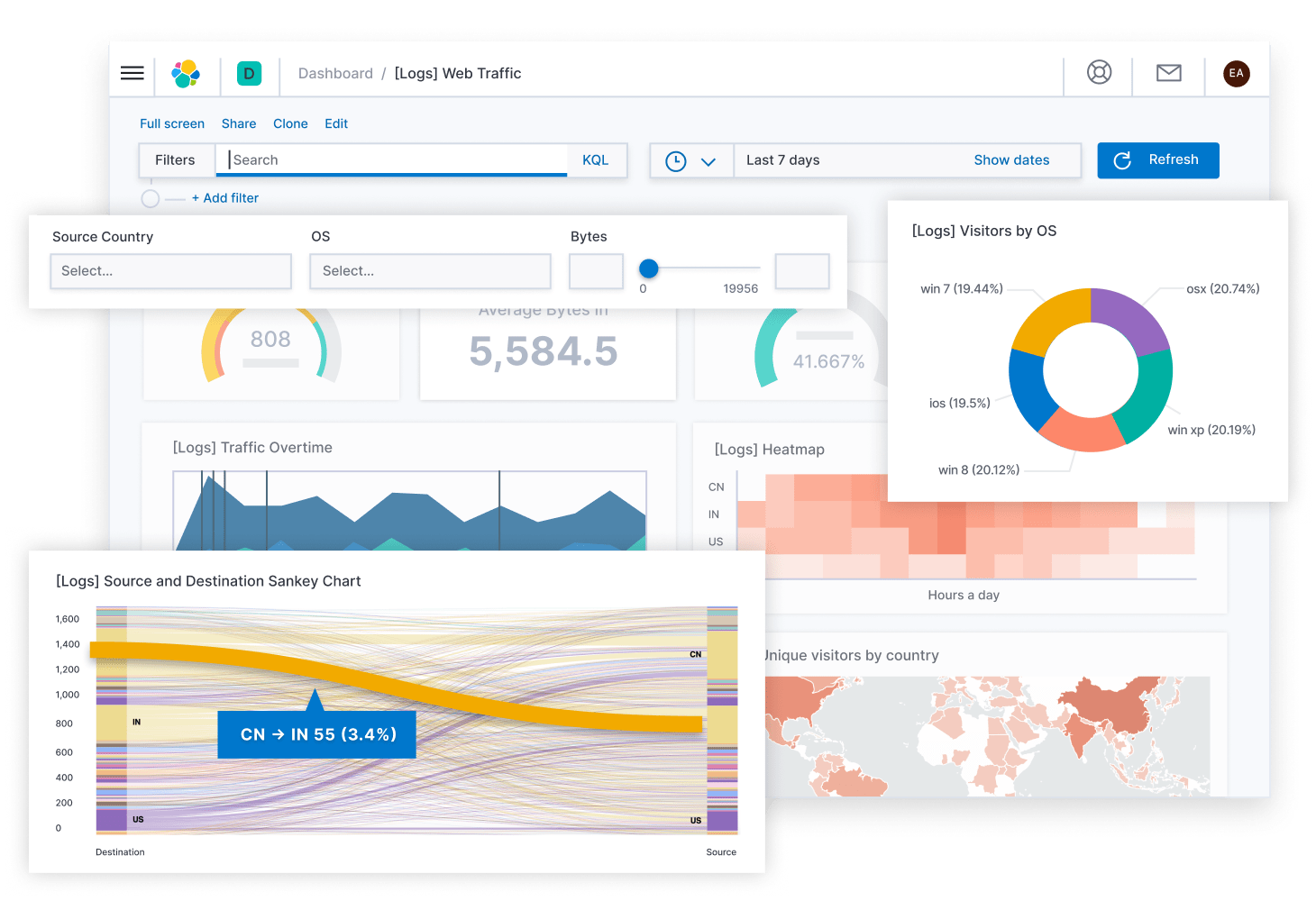
What is Logging in Kubernetes?
In Kubernetes, logging refers to the process of collecting, storing, and analyzing log data generated by the various components and applications running within a Kubernetes cluster. Logging is a crucial aspect of managing and troubleshooting applications in a containerized environment like Kubernetes. It allows you to gain insights into the behavior and performance of your applications and infrastructure.
Kubernetes Logging Tools
In the fast-paced world of container orchestration and management, Kubernetes has emerged as the go-to platform for deploying and scaling applications. However, with great power comes great responsibility, and that includes managing logs efficiently. Kubernetes generates an abundance of logs, and to make sense of them, you need robust logging tools. In this blog post, we’ll explore some popular Kubernetes logging solutions: ELK Stack, Graylog, Loki, Splunk, and Mezmo.
1. ELK Stack (Elasticsearch, Logstash, Kibana)
The ELK Stack is a well-established, open-source logging solution used by organizations worldwide. It consists of three components:
- Elasticsearch: This is the heart of the stack, providing storage and search capabilities for your log data. Elasticsearch’s distributed nature makes it highly scalable, ideal for Kubernetes clusters.
- Logstash: Logstash is responsible for data collection, processing, and enrichment. It can gather logs from various sources and send them to Elasticsearch for storage.
- Kibana: Kibana is the visualization and analysis component. It offers a user-friendly interface for querying, analyzing, and visualizing log data stored in Elasticsearch.
Pros of ELK Stack:
- Mature and widely adopted.
- Scalable and customizable.
- Powerful visualization and querying capabilities with Kibana.
Cons of ELK Stack:
- Complexity in setting up and maintaining.
- Requires expertise in configuring and tuning for optimal performance.
2. Graylog
Graylog is another open-source log management platform known for its user-friendly interface and scalability. It offers features like alerting, dashboards, and real-time log analysis.
Key Components of Graylog:
- Graylog Server: It collects and processes logs, offering flexibility in data source integration.
- Graylog Web Interface: Provides a web-based dashboard for log search and analysis.
- Elasticsearch: Graylog uses Elasticsearch for storing and indexing log data.
Pros of Graylog:
- User-friendly interface.
- Scalable architecture.
- Alerting and dashboard capabilities.
- Extensive community and plugin support.
Cons of Graylog:
- Requires Elasticsearch expertise for backend management.
- Setting up can be intricate for beginners.
3. Loki
Loki is a relatively new player in the Kubernetes logging space, developed by Grafana Labs. It’s designed for efficiency and optimized for Kubernetes environments.
Key Features of Loki:
- Prometheus Integration: Loki can be seamlessly integrated with Prometheus for log correlation with metrics.
- LogQL Query Language: It uses LogQL for querying logs, which is similar to PromQL used in Prometheus.
- Cost-Efficient Storage: Loki stores logs in a cost-efficient manner, making it suitable for long-term retention.
Pros of Loki:
- Lightweight and resource-efficient.
- Integrates well with Prometheus.
- Cost-effective log storage.
Cons of Loki:
- May not be as feature-rich as some other solutions.
- Limited out-of-the-box visualization capabilities.
4. Splunk
Splunk is a widely recognized commercial log management and analytics tool. It offers a range of solutions for log analysis, security, and monitoring.
Key Features of Splunk:
- Splunk Enterprise: The core product for log ingestion, analysis, and visualization.
- Splunk Cloud: A cloud-hosted version of Splunk Enterprise.
- Splunk Phantom: For security orchestration and automation.
Pros of Splunk:
- Comprehensive log management features.
- Strong security and compliance capabilities.
- A vast ecosystem of integrations and apps.
Cons of Splunk:
- High licensing costs.
- Resource-intensive, which can lead to scalability challenges.
5. Mezmo
Mezmo is a newer player in the Kubernetes logging space, known for its simplicity and ease of use. It focuses on making logging accessible to developers.
Key Features of Mezmo:
- Agentless Architecture: Mezmo doesn’t require agents, simplifying deployment.
- Real-time Streaming: It offers real-time log streaming and searching capabilities.
- User-Friendly Interface: Mezmo’s interface is designed to be intuitive for developers.
Pros of Mezmo:
- Easy to get started with.
- Minimal setup and maintenance.
- Cost-effective, with flexible pricing options.
Cons of Mezmo:
- May lack some advanced features compared to more mature solutions.
- Smaller community and fewer integrations.
Conclusion
Selecting the right logging tool for your Kubernetes environment depends on your specific requirements, expertise, and budget. The ELK Stack and Graylog are solid choices with extensive features, while Loki provides efficiency and cost savings. Splunk offers enterprise-grade capabilities but comes with a higher price tag. Mezmo, on the other hand, is a newcomer that focuses on simplicity and accessibility.
Ultimately, the choice boils down to your organization’s needs and preferences. It’s essential to evaluate each option and consider factors like ease of use, scalability, cost, and community support to find the Kubernetes logging solution that best suits your requirements.